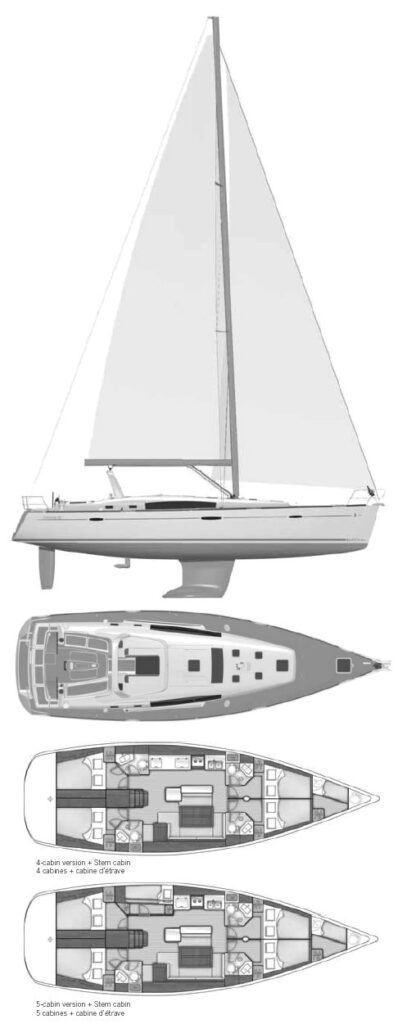The Beneteau Oceanis 50, launched in 2010, represents a significant evolution in Beneteau's renowned line of cruising sailboats, designed to offer a harmonious blend of performance, comfort, and spacious living on the water. Conceived as a robust and elegant platform for long-distance voyaging and comfortable family cruising, she embodies the French builder's commitment to accessible yet sophisticated yachting. This model benefits from the naval architectural expertise of Berret Racoupeau and the refined interior styling of Nauta Design, promising an inviting and efficient sailing experience.
Oceanis 50 (Beneteau) Information, Review, Specs

- Make
- Beneteau
- Model
- Oceanis 50
- Number Built
- Production Year(s)
- 2010 - ??
History and Design
The Oceanis 50 began production in 2010, marking a new era in Beneteau's long-distance cruising offerings. As part of the fifth generation of Oceanis yachts, her design philosophy centered on enhancing "well-being" on board, combining modern aesthetics with proven seaworthiness. Beneteau, a company with a rich heritage dating back to 1884 and a pioneering spirit in fiberglass construction since the 1960s, collaborated with respected naval architects like Jean Berret and Olivier Racoupeau (Berret Racoupeau Yacht Design) for the yacht's lines. The interior, styled by Nauta Design, focused on optimized space ergonomics and a contemporary feel, reflecting Beneteau's consistent effort to balance performance with practical and comfortable accommodations. The Oceanis 50 notably shares its hull with the earlier Oceanis/Beneteau 49, and a similar version was also marketed as the Moorings 50.5.
Sailing Performance and Handling
With a length overall of just under 50 feet and a waterline length exceeding 43 feet, the Oceanis 50 is designed for spirited sailing and eats up miles efficiently. Her displacement of 27,454 pounds combined with a sail area of 1,183 square feet yields a Sail Area to Displacement Ratio of approximately 20.73, suggesting a boat that performs well in lighter air conditions while still handling stronger breezes with confidence. The ballast of 9,480 pounds provides a ballast to displacement ratio of around 34.5%, contributing to a moderate level of stiffness and stability under sail. Furthermore, a Displacement to Length ratio of approximately 147.6 categorizes her as a relatively lighter, performance-oriented cruiser for her size.
Reviews often describe the Oceanis 50 as "fun to sail" and a "spirited sailer." Her handling characteristics are frequently praised, noted for being well-balanced and easy to manage, even in varying sea states. The design incorporates twin rudders, a feature that enhances safety, boosts confidence, and improves overall handling, particularly beneficial for a yacht of this size. Owners and testers alike commend her performance in nearly all conditions, highlighting her balance and responsiveness under sail.
Accommodations and Layout
The Beneteau Oceanis 50 is renowned for its spacious and carefully considered interior layout, reflecting Nauta Design's focus on elegant and contemporary living spaces. While specific headroom details vary by cabin, the overall design prioritizes light, ventilation, and ergonomic use of space. Typical configurations include multiple cabin options, often featuring a luxurious master cabin forward and one or more double cabins aft, accommodating larger families or charter groups comfortably.
The interior typically includes multiple heads (bathrooms) with showers, a generously sized salon for dining and relaxation, and a well-appointed galley designed for extended cruising. Finish quality generally involves a tasteful blend of wood trim and fiberglass surfaces, consistent with Beneteau's production standards, offering durability with aesthetic appeal. Ample storage is integrated throughout the vessel, catering to the needs of long-term cruisers. The emphasis on large windows and optimized layouts ensures a bright and inviting atmosphere below deck.
Measurements
Construction & Hull
- Construction Material
- Fiberglass (Solid)
- Hull Type
- Monohull Sailboat
- Keel Type
- Bulb
- Rudder
- 1x Spade
- Ballast
- 9480 lbs
- Displacement
- 27454 lbs
- Water Capacity
- 149 gal
- Fuel Capacity
- 62 gal
Engine
- Engine Make
- —
- Engine Model
- —
- Engine Type
- —
- Engine HP
- 76
- Engine Count
- 1
- Drive Type
- —
- Fuel Type
- Diesel
Rig & Sails
- Rig Type
- Fractional Sloop
- P (Main Luff)
- -
- E (Main Foot)
- -
- I (Foretriangle Height)
- -
- J (Foretriangle Base)
- -
- Forestay Length (est)
- -
- Main Sail Area
- -
- Foretriangle Sail Area
- -
- Total Sail Area (Reported)
- 1183 sqft
- Total Sail Area (Calc)
- -
Dimensions
- LOA
- 49.54 ft
- LWL
- 43.63 ft
- Beam
- 14.76 ft
- Draft
- 5.58 ft
- Max Headroom
- -
- Air Draft
- 63.5 ft
Calculations
- Hull Speed
- 8.85 kn
- Pounds per Inch Immersion
- 2